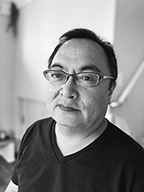Juror
Higashi Takuma

[Juror’s Statement]
When we listen to songs, we are listening to voices. When we look at photographs or documentaries, we are seeing faces. At least, that is one way of describing it.
But how, in the first place, do we talk about the perceptions and experiences that we acquire through listening and looking? How do we put into words that “something” that we take, that we are struck with, from my and others’ voices or faces?
We should be able to ask this much. What does it mean to listen to voices, to look at faces? Beyond a single voice, many voices might carry on and echo. In a single face, countless interwoven faces might be carved.
What is more, people might sometimes look at voices or listen to faces. This does not just mean looking at or listening to these things, but being willing to be exposed, open to various stimuli.
Sometimes, “voices” and “faces” are described as that which represents, symbolizes certain eras or groups. That is, certain voices and faces can sometimes speak not only about the people behind them, but also with eloquence about their time and land.
However, sometimes, that “eloquence” is not what the word suggests. Rather, it speaks with an abundance completely different from that of explanatory words. So, there are also times when even eloquence must be expressed as complete silence.
The Yamagata International Documentary Film Festival is that which conveys to us the voices and faces, the various images that take pride in their eloquence, of “documentary film,” which tends to be seen as a narrow category. I am struck not only by the expanding world of documentaries, but also, by their own world, like a point of juncture on this world.
This year, I received the invitation to serve as juror and happily agreed to take part. As a spectator, I want to expose my all to the film festival. I am genuinely looking forward to encountering the many films, artists, voices, and faces that appear therein.
Born in Hiroshima in 1964, after living in Tokyo Higashi moved back to his home city in 2005. With a focus on music criticism, he has written prolifically. Some of his notable books include Latin music to iu chikara (Ongaku no tomosha, 2003), Zen sekai ongaku ron (Seidosha, 2004), Hiroshima dokuritsu ron (Seidosha, 2007), Hiroshima noir (Inpakuto Shuppankai, 2014), and Bokyaku no kioku Hiroshima (Getsuyosha, 2018, co-authored). Higashi has taught at prominent institutions such as Tokyo University of Foreign Studies, Seikei University, and Hiroshima Jogakuin University. In addition, Higashi serves as the secretary general of the Hiroshima Peace Film Festival, where he introduces and critiques films on the subjects of nuclear power and Hiroshima. Although he was long active full time as a freelance writer, in recent years he returned to an office job and now advocates a “fully devoted amateur, part-time critic” lifestyle.
